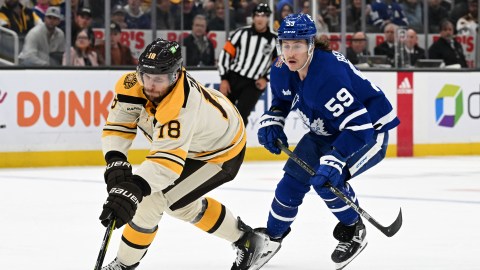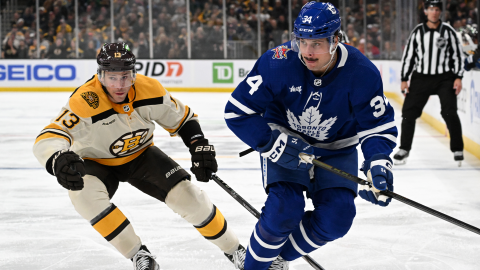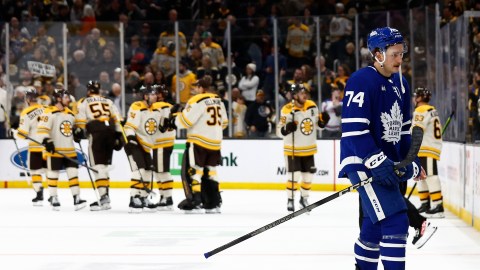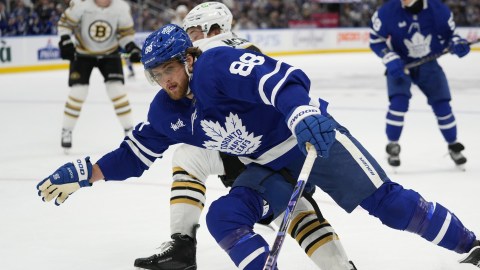The NHL, plain and simple, missed an opportunity to show it actually gives a hoot about player safety.
The league's decision to not suspend, fine or punish Zdeno Chara for his hit on Max Pacioretty has the hockey world divided. Many argue that the hit in question was just a hockey play gone wrong, that Chara had no intent to seriously injure Pacioretty and that, accordingly, he deserved no punishment beyond his five-minute major penalty and game misconduct.
Many others, including just about everyone who supports the Canadiens, feels that what Chara did was malicious, that he intentionally slammed Pacioretty's head into the stanchion and that he should have been suspended for anywhere from 10 games to the rest of the season.
Consider this opinion somewhere in the middle.
The problem with the second argument is that no matter how hard we try, no matter how much we look at circumstantial evidence, no matter how much we can infer from the two players' history, we can never know the neurological activity of Zdeno Chara. It is a dangerous game to try crawl inside any man's mind, and accusations of intent can never be anything more than assumption.
The problem with the first argument is that while it was indeed a hockey play, there is no question that Chara could have been more careful. That's why, even though the league will tell you that Chara did not violate one single rule in the book, he could have and should have been suspended for a game or two.
Yet, for whatever reason, the NHL regularly decides to stick to the exact letter of the law, despite overwhelming visual evidence to the contrary. No, Chara did not leave his feet, lead with an elbow or target the head, but he laid a hit on a guy in a vulnerable position. It was a hit that didn't need to happen and it developed slowly enough for Chara to pull up. Instead, he shoved Pacioretty, who now is recovering from a broken vertebra and a "severe concussion."
Was Chara's hit evil, malicious or planned? No, that is highly, highly doubtful. Could it have been avoided? Absolutely.
And that's where the NHL is missing the mark with its discipline. If you read Mike Murphy's explanation from Wednesday, you can find striking similarities with Colin Campbell's statement last March regarding Matt Cooke's hit on Marc Savard. We "couldn't find" any violation, they say. It was "unclear" if Cooke led with an elbow or a shoulder. The hit "happened very quickly" and we can't find "anything wrong" with it.
If the league's disciplinarians can't find anything wrong with Cooke's vicious hit on Savard, and if they can't find anything wrong with a late hit that broke a man's neck, then they don't know how to look for it.
What the league seems to be most worried about is setting a precedent. Campbell and Murphy figure that if they suspend a guy for a hit that doesn't necessarily violate any one rule, the players won't know the rules that are governing them on the ice. For them, it's all about setting a precedent.
But really, would it be setting a bad precedent to say, "You know what, you can't shove a guy into a stanchion two seconds late," or, "Hey, you can't fly in from a guy's blind side with a swinging elbow to the temple"? The only precedent a suspension would set is that players would know they need to be more careful. They need to be less reckless. When they're about to make a borderline hit, there could be something in the back of their minds telling them that maybe they should hold up.
Instead, there's nothing, and as cliche and overblown it may sound, someone else is going to get hurt. That's fact. Will the offending party be suspended? That's hard to say.
It's obviously not a secret that the NHL's process of suspending and fining players is spotty, to put things politely. Jack Edwards' "dartboard justice" story was a rather accurate portrayal of the league's issues, as the NHL suspended Milan Lucic in the playoffs based on evidence that wasn't clear.
"While it is unclear whether Lucic's glove or stick makes contact with [Maxim] Lapierre," Campbell said of the Lucic suspension, "what is clear is that he delivered a reckless and forceful blow to the head of his opponent."
To recap, there wasn't enough evidence to know for sure, but it was close enough to suspend a player in the playoffs. If that's the way the league wanted to go when it comes to suspensions, then OK. That's erring on the side of player safety.
How, then, do you explain the lack of action on Cooke or Chara? Was there not enough reason to believe that what Cooke did was dangerous and has no place in hockey? Was there not enough reason to believe that Chara's hit was late, unnecessary and dangerous? And wasn't this Lucic cross-check to the head (one that went completely unnoticed by the league, mind you) more obvious and clear than the one on Lapierre?
The answers just aren't there from the league.
If it needs an example, it could look to the NFL. While football's labor situation remains very much unsettled, its stance on dangerous head shots is anything but. Call it phony or contrived, but regardless of the intention behind Roger Goodell's crusade against helmet-to-helmet hits, the NFL is not messing around. Any hit deemed to be even in the gray area resulted in heavy fines last year. It's impossible to prevent helmet-to-helmet hits completely, but at least the NFL can say it's trying.
The NHL, however, just isn't doing the same.
With no suspension for Chara, there won't be any hesitation from him or anyone else to unload on a player caught near the glass at the end of the boards. A two-game suspension would have been enough to simply tell players to be more aware of their surroundings and to think twice before making such a hit.
But if the league is unwilling to think twice, it only makes sense that the players shouldn't be expected to live up to a higher standard.
Would a one- or two-game suspension have been a good, safe call by the league, even if Chara's hit wasn't malicious? Share your thoughts below.
Should the NHL have suspended Zdeno Chara a game or two to send a message of safety?online surveys



